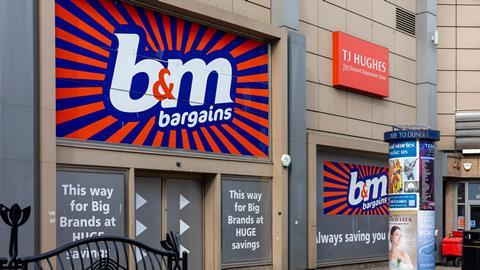Shares for discount retailer B&M were already trading at a record low of 217.6p, down 39% so far in 2025. And today things got worse.
An accounting error meant about £7m in overseas freight costs was not correctly recognised in the cost of goods sold in its first-half results announcement on 7 October, the company told the London Stock Exchange this morning.
The upshot is a £40m downgrade in earnings guidance for the full year, from £510m-£560m to £470m-£520m.
CFO Mike Schmidt has wasted no time at all in stepping down. “There was no way he could have stayed with the company given the severity of the error discovered in the retailer’s accounts” says AJ Bell head of markets Dan Coatsworth.
An embarrassing mistake
Investors are exasperated – the share price dropped another 22% to 170.8p this morning. City analysts are not only questioning the business’s financial controls but looking again at the credibility of the turnaround plan it laid out in July.
“Just when it looked as if life couldn’t get any worse for B&M, along comes an accounting error which has ultimately cost the finance boss his job,” says Coatsworth. “The situation is highly embarrassing for the board and even worse for shareholders.
“Failing to recognise £7m of freight costs is a major mistake and suggests the business has poor financial controls. It’s inevitable investors will now start to question if other accounting mistakes have been made.”
Panmure Liberum research analyst Ben Hunt asks: “Just a blip or something more sinister?”
Shore Capital research analyst David Hughes calls it “very disappointing”, adding: “The concerns for us are that it suggests the company is less on top of its costs numbers than we would expect”.
Even assuming it is a one-off – and B&M assures us “the underlying system issue has been resolved” – it’s worrying because of what it says about the retailer’s margins and its road back to targeted growth.
‘Skinny margins’
B&M Group CEO Tjeerd Jegen, in the job since June, announced a ‘back to basics’ turnaround plan in the first-half results, including sharpening its price proposition.
Profits had sunk by 28% to £198m in the 26 weeks to 27 September, primarily due to a weak like-for-like performance at B&M UK – which accounts for about 80% of the group’s revenue – and lower trading gross margins.
But like-for-likes and gross margin had been gradually improving toward the end of the second quarter, the company reassured the market, as actions to address operational weaknesses began to pay off. This morning’s update maintains a target of low-double-digit EBITDA margins, expected to come as like-for-likes improve further.
Analysts are sceptical, since the correction of the accounting error means “margins are skinnier than some might have thought”, notes Coatsworth.
Hughes says: “Coming from a lower-than-expected gross margin makes the road back to the targeted ‘low-double-digit’ EBITDA margins tougher than previously thought. Especially when one considers that part of the outlined strategy is to invest in price and promotion, well needed to improve like-for-like revenue performance, but a move not typically conducive to margin recovery.”
Back to basics
The competitive environment is also changing, with Poundland going hard after value and simplicity in its own back to basics strategy, backed by £90m in investment from new owner Gordon Brothers. In the immediate term that can only mean more pressure for B&M’s price position.
Jegen’s back to basics plan also includes reducing SKUs to improve availability of the most popular lines.
“We found that our emphasis on store presentation prioritised the look of a full shelf over actual stock availability of products customer want,” the first-half trading update admitted. “Supported by better replenishment processes and simpler ranges, our stores will now be focused on ensuring our most popular products are always available to our customers, in order to drive sales performance.”
You could call that eminently sensible, or you could call it bleeding obvious. Today’s news will win no converts to the first assessment.
“These initiatives read like a beginner’s guide to retailing, begging the question why they weren’t implemented in the first place,” says Coatsworth. “Now we’ve had financial mistakes on top, so it’s only natural to wonder if the business has well and truly gone off the boil.
“A big share price slump implies that some investors no longer want to hang around to find out.”
A search is underway for a successor to Schmidt, who is to remain at the company until one is found. In the meantime, a tough job just got tougher for Jegen and the rest of B&M management.




















No comments yet